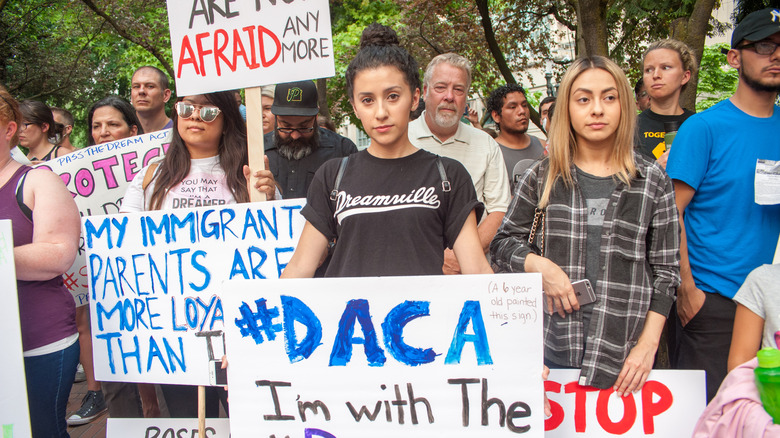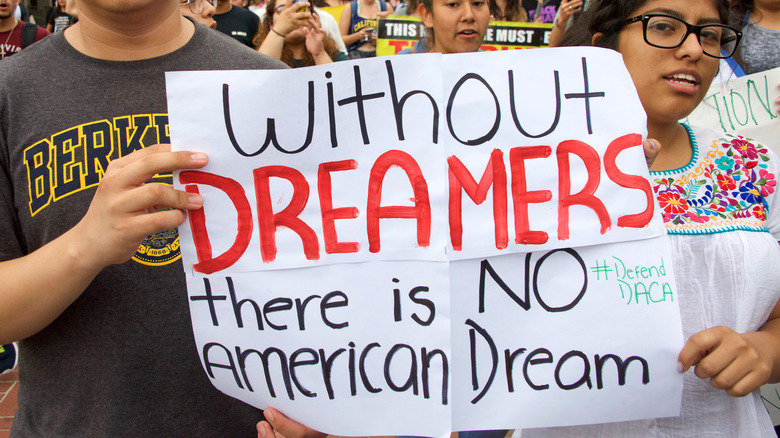How Starbucks Supports DACA Recipients
According to the University of California at Berkeley, Deferred Action for Childhood Arrivals (DACA) was established to protect immigrants who arrived in the United States as children by providing these undocumented individuals with work permits and protection against deportation. To apply for the program, Immigration Equality outlines that individuals have to meet specific criteria, including having been under the age of 16 when first arrived to the United States, be currently in school or have graduated with a high school diploma or hold a GED equivalent, have no felony convictions, and not pose threat to national or public safety.
Many DACA recipients were 7 years old when they came to the United States, and over one-third were 5 years or younger, according to the Center for American Progress Action Fund. The average age of recipients is 27 years, reports the American Immigration Council, and the program has helped more than 800,000 young people work, go to school, and plan their futures without threat of deportation. The program has resulted in better pay and benefits, improved working conditions, and education opportunities for these individuals, even stimulating local and national economies (via Center for American Progress Action Fund).
Supporting diversity and inclusion
Established by the Obama Administration in 2012, the Trump Administration declared in 2017 the program would be phased out and new applications would not be accepted, yet a national injunction ordered the program's restart, and a series of court actions have since taken place (via Arison State University Ross-Blakley Law Library).
In 2017, Starbucks' CEO Howard Schultz penned a letter to U.S. Senators Lindsey Graham and Richard Durbin advocating for the program. "As an American grown business, with stores in over 7,000 communities across our country, we are proud of the fact that our 150,000 partners (employees) reflect the diverse communities we serve. Inclusion and humanity are fundamental to who we are as a company and to how we approach our communities," he wrote. "We strive to be a place where everyone, from our partners to our customers, feels welcome and valued.."
Schultz listed the initiatives Starbucks put in place to support DACA recipients, including reimbursement for program fees and services at the company's Opportunity Youth fairs.
A commitment to advocacy
In 2020, the U.S. District Court ordered the Department of Homeland Security to reinstate the DACA program, yet in 2021, a federal judge ruled the program illegal and blocked new applications (via U.S. Citizenship and Immigration Services). Most recently, on October 5, 2022, the U.S. Court of Appeals for the Fifth Circuit determined DACA policy unlawful; However, per court order, renewal requests must be processed, employment authorization requests must be reviewed, and new DACA requests are to be accepted as the case moves through layers of the justice system.
Starbuck's chief global public policy counsel Zulima Espinel posted an open letter emphasizing the need to support DACA recipients. "We are proud that 250,000 partners across the country reflect the diverse communities we serve. Every day, you create welcoming spaces for each other and our customers and every day we are inspired to extend that sense of belonging beyond the four walls of our stores," said Espinel, recommitting advocacy, resources, and benefits for immigrants, including a free and confidential Immigration Advisor. Starbucks has also joined a team of companies banding together as The Coalition for the American Dream, urging Congress to pass legislation helping DACA beneficiaries obtain citizenship legally.
"We will continue to support and advocate for Dreamers so they can live, work, and dream in the country that they call home — not only because it is the right thing to do but because the communities we serve will be stronger for it," writes Espinel.


